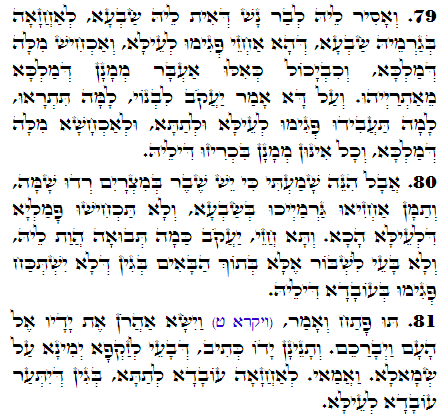Daily Zohar # 3333 – Emor – How to protect your ‘gifts’
Daily Zohar 3333

.
Hebrew translation:
80. אֲבָל הִנֵּה שָׁמַעְתִּי כִּי יֶשׁ שֶׁבֶר בְּמִצְרָיִם רְדוּ שָׁמָּה, וְשָׁם הַרְאוּ אֶת עַצְמְכֶם בְּשֹׂבַע, וְאַל תַּכְחִישׁוּ פָמַלְיָא שֶׁל מַעְלָה כָּאן. וּבֹא רְאֵה, כַּמָּה תְבוּאָה הָיְתָה לְיַעֲקֹב, וְלֹא רָצָה לִשְׁבֹּר אֶלָּא בְּתוֹךְ הַבָּאִים, כְּדֵי שֶׁלֹּא יִמָּצֵא פְגָם בְּמַעֲשֵׂהוּ.
81. עוֹד פָּתַח וְאָמַר, (ויקרא ט) וַיִּשָּׂא אַהֲרֹן אֶת יָדָו אֶל הָעָם וַיְבָרֲכֵם. וְשָׁנִינוּ, יָדוֹ כָּתוּב, שֶׁרָצָה לִזְקֹף יָמִין עַל שְׂמֹאל. וְלָמָּה? לְהַרְאוֹת מַעֲשֶׂה לְמַטָּה, כְּדֵי שֶׁיִּתְעוֹרֵר מַעֲשֶׂה לְמַעְלָה.
.
Zohar Emor
Continued from previous DZ
#79
Those who have plenty at times of famine, should not show it out because it would be against the will of the King and like removing and stopping his appointees from governing the famine.
Jacob told his children “Why do you look at one another?”, to warn them from creating a blemish in the upper and lower levels and go against the will of the King.
#80
Genesis 42:2
“וַיֹּאמֶר הִנֵּה שָׁמַעְתִּי כִּי יֶשׁ שֶׁבֶר בְּמִצְרָיִם רְדוּ שָׁמָּה וְשִׁבְרוּ לָנוּ מִשָּׁם וְנִחְיֶה וְלֹא נָמוּת.”
“And he said, “Indeed I have heard that there is grain in Egypt; go down to that place and buy for us there, that we may live and not die.”
The famine in the land of Canaan didn’t affect Jacob and his children. To avoid showing himself as above the rest and going against the decree of God, he sent his children like the other people of the land to buy grain from Egypt.
#81
Leviticus 9:22
“וַיִּשָּׂא אַהֲרֹן אֶת ידו [יָדָיו] אֶל הָעָם וַיְבָרְכֵם וַיֵּרֶד מֵעֲשֹׂת הַחַטָּאת וְהָעֹלָה וְהַשְּׁלָמִים.”
“Then Aaron lifted his hands toward the people, blessed them, and came down from offering the sin offering, the burnt offering, and peace offerings.”
The word for his hands ‘ידו’ in the Torah is written in a singular form but we read it as ‘יָדָיו’, which is a plural form. The word in the Torah is missing the letter י Yod that numerically 10 and represents the Light from above.
Aaron raised his two hands while the right hand was above the left to activate the light above to come down and bless the people.
Lesson;
Some people are blessed with ‘gifts’ while others experience great lack. Those who are blessed should humble themselves and avoid showing that their grass is greener than the neighbor’s grass.
The tenth commandment “You shall not covet” is related to the material world. We shall not desire anything that the other person has because it will take energy from them. For that reason, we should avoid ‘exposing’ our ‘gifts’ to protect them.
The missing Yod (10) from the verse above can be explained as the aspect of Aaron giving the tenth with the offerings that he places on the Altar as Tithe to God so he can channel the blessing to the people.
Giving tithe is a connection to the Light. By giving the tenth/Malchut we keep the Light of the other nine parts and make room for more light to come down to nourish and protect us.
{||}

 Previous: Emor
Previous: Emor
